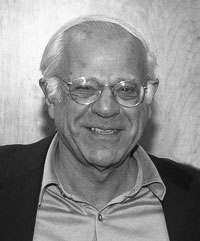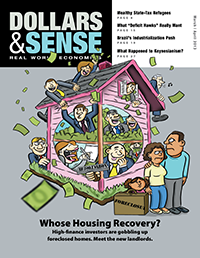
Stephen A. Resnick was a leading American Marxian economist for over four decades--from the 1960s, when the struggle against the Vietnam War brought him to Marxism, until his death this January. His parents were Boston retail-trade workers whose son showed exceptional aptitude for reading and thinking. That took him to the Wharton School at Pennsylvania and on to MIT for his economics Ph.D., studying in the 1960s with future Nobel laureates Paul Samuelson and Robert Solow. His first job out of graduate school was as an assistant professor at Yale, where I met him as a grad student in his class. Steve was thus launched on the pampered elite track for docile exponents of mainstream economics, at that time a tense "synthesis" of neoclassical microeconomics and Keynesian macro. Young people from below, myself included, were allowed--a few at a time--onto such tracks.

March/April 2013 issue.
How troubling to the profession, then, when so many of us left that mainstream, having found it polluted by its uncritical subservience to the capitalist status quo. Many of us formed the Union for Radical Political Economics (URPE) to break from the mainstream American Economics Association (AEA). Some of us engaged the most serious and best-developed of the alternatives to both neoclassical and Keynesian economic paradigms: Marxism. Steve thus redirected his twin passions of economic theory and econometrics toward the goals of social change and mastery of Marxian economics.
Yale responded to this shift predictably-- by blocking Steve?s promotion beyond associate professor. So, in 1971, he joined me at the City College of New York. Its new chairman, Alf Conrad, recently decamped from the Harvard Business School, was building a strong Marxian section of the economics department. There we taught the first semesters of "open admissions," that wonderful moment when New York?s children all became eligible for a free college education: testimony to New York's working-class struggles and victories.
But then UMass-Amherst made Steve and me (and Sam Bowles, Herb Gintis, and Rick Edwards) an offer we could not refuse. We all took positions there in 1973. Steve and I focused on developing a Marxian component of the curriculum, both undergraduate and graduate. From the mid-1970s to 2010, Marxian economics was a major concentration available to interested students from the United States and around the world. What UMass achieved then was a key contribution to this striking result: more Marxian economists are teaching in U.S. colleges and universities today than ever before.
Thanks especially to Steve, much of that Marxian economics was freed from mechanical, formulaic interpretations that reflected the exigencies of Soviet economic development and foreign policy, and the pressures and legacies of Cold War polarizations. Likewise, Steve took the lead in interrogating major modern theoretical breakthroughs (such as structuralism, semiotics, post-structuralism, and postmodernism) to see how their insights could enrich Marxian economics.
Most of Steve's work was devoted to collaborations with me on Marxian theory. Our first major book, Knowledge and Class: A Marxian Critique of Political Economy, was published by the University of Chicago Press in 1987, over Milton Friedman's objection. It established a different interpretation of Marx&srquo;s concepts of class and of causality (newly renamed "overdetermination," a term taken from Sigmund Freud and the Marxian philosophers Gy?rgy Luk?cs and Louis Althusser). In our many books and articles over the years, we developed these concepts into a genuinely new Marxian economics.
The last year of Steve's life, 2012, saw the publication of our Contending Economic Theories: Neoclassical, Keynesian and Marxian by the MIT Press. The book is a summary of what divides the economics profession and an exploration of the high stakes of that division. It is also a tool for passing on, to a new generation, the excitement and political power that flow from a key realization: that economics always was, is, and will be a contested terrain of differing perspectives connected to clashing political agendas.
Last year, Steve and I noted, with a certain ironic satisfaction, that capitalism's worst crisis since the 1930's has turned a new generation of young people toward the criticism of capitalism and thereby the discovery of Marxism. What they are now learning owes a great deal to the superb mind and passionate commitment of Steve Resnick.
